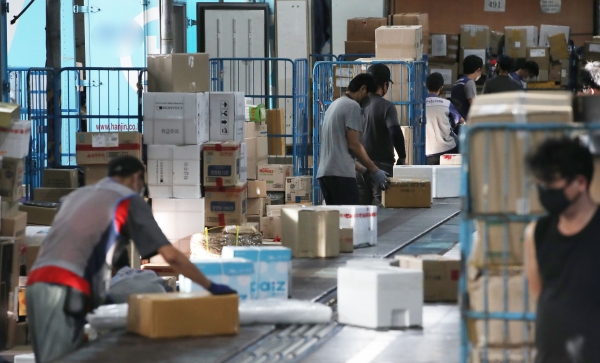The delivery service industry in Korea has developed rapidly since the 2000s. This year, especially, the delivery industry had an unprecedented boom as online orders increased due to the COVID-19. However, the working conditions for delivery workers had not been improved along with the growth. Their working environment rather has become even worse due to the expansion of same-day delivery services that focused on consumers’ convenience. According to the delivery workers’ union of Korea, 14 workers died from overwork this year. In particular, a series of victims occurred in October as they had to handle a higher volume of parcels due to the Chuseok holidays. On October 8th, a worker for CJ logistics collapsed while working at night and died in the hospital. “My son always ran around all night and didn’t have time to eat,” his father said. On Oct 12th, a worker of Hanjin transportation committed suicide after leaving a message to a colleague about his hard conditions he had toiled in. As a series of unfortunate accidents have occurred, there have been growing voices for improving the working conditions of deliverymen. What situation are they in, and how should this be solved?
Unreasonable Labor Structure
Low Unit Price of Delivery
Delivery workers’ labor structure is unreasonable. This is because the unit cost of delivery related to their wages is decreasing while their workload is increasing. The average unit price of delivery has been steadily lowered. According to the Korea Integrated Logistics Association, the average delivery price per box was 3,500 won in 2000, while it fell to 2,269 won in 2019. Lee Sang-hoon, former president of Doosan Corporation, pointed out that Korea’s delivery costs are very low compared to other countries (7,300 won in Japan and 10,000 won in the United States). He also said that “In order for a delivery worker to earn 4.7 million won, the average monthly income of the middle class of Korea, the worker has to deliver about 9,000 parcels, which is the workload that can be done by delivering a box every two minutes for 12 hours without a break.” The reason for the lower in unit price is price competition among logistics companies. Due to the characteristics of the delivery industry, which is difficult to differentiate services, the companies attempt to attract consumers through the low cost of delivery. In this environment, competition between delivery companies has intensified.
High Intensity of Work
Entering the 2000s, the size of the delivery industry grew very fast. Park Jong-shik, a researcher at Changwon National University’s Social Science Institute, the size of the delivery industry has increased from 200 million parcels and 646.6 billion won in sales in 2001 to 2.7 billion parcels and 6.33 trillion won in sales in 2019. As the size has grown, the burden on deliverymen has also increased. In an interview with KBS on October 12th, the delivery union explained that a worker delivers an average of 300 to 400 parcels a day, and they can’t afford to walk and eat calmly. Also, delivery workers point out that classification work is the main cause of their overwork. The classification work refers to a process that a deliveryman sorts out the parcels of his area of responsibility at the terminal and loads them into the car. But the problem is that the classification work is so-called “free labor” that the workers are not paid. Lee Joo-chan, a reporter of JTBC who directly covered the delivery site in October, said that the sorting process alone takes 7-8 hours before they start their main delivery work. As too much time is spent on sorting, some deliverymen directly hire part-time jobs who are dedicated to sorting.

Workers Who are in Special Form of Employment
The reason for the increase in the intensity of delivery workers’ work is largely because they are ‘workers in special employment.’ Workers in special employment refer to the people who receive income as much as they work and decide working hours personally. Most delivery workers are not directed employed by the logistics companies but make subcontracts with agents between the two. Until the early 1990s, when the delivery industry was in its early stages, delivery workers signed a direct employment contract with the logistics companies and received a fixed salary. But after the foreign-exchange crisis in 1997, they were converted to ‘workers in special employment.’ In addition to the reason for the financial crisis, researcher Park explained that the transition was because the characteristic of the delivery work is relatively simple and therefore does not require special instructions. As they are classified as self-employed, not wage workers, they are left outside the protection of the Labor Standards Act. This results in poor working conditions. The 5-day workweek has been introduced in stages since 2004 and the 52-hour workweek has also been introduced in 2018. But as delivery workers are not wage workers, there is no regulation of working hours. According to data released by the delivery workers’ union on September 10th, the average weekly working hours for delivery workers were 71.3 hours.
Also, delivery workers are not properly guaranteed to subscribe to industrial accident insurance. Workers in special employment, including delivery workers, are covered by industrial accident insurance in principle, but they can refuse to join if they apply for exclusion. The problem is that delivery companies often use this to force the workers to apply for exclusion. This is because if the workers subscribe to the insurance, the companies should pay half of the insurance premiums. It is hard for the delivery workers to reject the demands of those who give them work. According to the data released by Yoon Mi-hyang, a lawmaker of the Democratic Party, 1,145 out of 3,746 delivery workers applied for the exclusion of industrial accident insurance as of August this year. There has even been a case in which applications for exclusion have been ghostwritten. The Korea Workers’ Compensation and Welfare Service (KCOMWEL) confirmed that the application of CJ logistics worker Kim who died on October 8th was ghostwritten. The KCOMWEL has announced its plan to nullify Kim’s application and collect the insurance premiums that have not been paid to his agency.
‘Quick Delivery’ Competition
Overwork of delivery workers is also attributed to the evolution of delivery services such as same-day delivery or even ‘next-morning delivery.’ The same-day delivery service, first launched by online bookstores about a decade ago, has recently expanded from food to products that do not require quick delivery such as clothing. Coupang greatly contributed to this change. The E-commerce company Coupang launched the same-day delivery service named “rocket delivery” in 2014. The rocket delivery service, which allows customers to receive goods the next day if they order before midnight, has become a sensation among consumers. Coupang said that as of 2019, the number of its distribution center has more than tripled from 27 in 2014 to 168 in 2019. Coupang’s success has prompted other online shopping companies. As the competition heats up, even the ‘quick commerce’ market, which delivers within an hour after ordering, has also emerged recently. Same-day delivery has raised consumers’ satisfaction, but the working conditions of deliverymen have become much worse. They have to deliver the goods until late night to complete their day’s workload. Researcher Park warned that consumers also need to reflect on the impact of the same-day delivery on the delivery workers. In fact, the pizza companies’ ’30-minute delivery system’ was abolished at the request of consumers and delivery workers’ groups in 2011. This is because the 30-minute delivery system, which returns certain costs to consumers if the deliverymen fail to deliver within 30 minutes, has led to a series of accidents.
How Can It Be Solved?
Delivery Companies’ Alternative Plans


Major logistics companies that are related to the accidents made public apologies over the deaths of workers and announced each alternative plan. CJ logistics firstly issued its plan to protect the delivery workers on October 22nd. The heart of the plan is the massive input of the workforce into the classification work. CJ logistics said its plans to spend 50 billion won every year and put 4,000 workers on the classification work. This is the size of one person in every five deliverymen. It also said that it will ask the specialized agency to calculate the appropriate amount for adults to deliver per day, and based on this, it will introduce an ‘excess volume sharing system’ that prevents the excess volume from being concentrated on certain workers. CJ also said that it will make all delivery workers subscribe to industrial accident insurance by the first half of next year. Meanwhile, Hanjin transportation announced its four major measures on the Oct 26th. First, it stops late-night delivery and distributes the volume. Hanjin announced plans to stop late-night delivery from November 1st and distribute the volume normally concentrated on Tuesdays and Wednesdays to other days. Accordingly, the quality of Hanjin’s delivery service is expected to deteriorate as the delivery is delayed. But Hanjin said it will focus on protecting deliverymen rather than on the immediate decline of service quality. The second is the input of the workforce to the classification work. Hanjin announced that it would put 1,000 workers to the nationwide agency from November in phases. One thing to note is that Hanjin will cover all costs of the workforce. Other logistics companies including CJ also vowed to inject the workforce to support the classification, but Hanjin is the only company that said it would pay the full cost. In addition, Hanjin promised to invest in automated services to reduce the time of classification work and to protect the health of deliverymen, and push for medical checkups.
Will the Five-day Workweek for Delivery Workers Be Possible?
Some say that a five-day workweek is a long-term solution to solve the problem of delivery workers’ overwork. On October 29th, a petition asking for the delivery workers’ 5-day workweek was posted on the Blue House Petition website. The petitioner, who revealed that he has been working as deliverymen for more than 20 years, said, “It’s been a long time since the 5-day workweek was introduced in many companies and offices, but it is just a wild dream in the delivery industry” and added, “l ask for many people’s attention so that delivery workers can be guaranteed more improved working conditions.” On the other hand, delivery companies do not welcome the 5-day workweek, saying it could reduce the service quality. Meanwhile, many experts pointed out that if the 5-day workweek is introduced, measures to limit working hours should also be implemented. Han In-im, a researcher of the Wonjin Institute of Occupational and Environmental Health, said that the key is to reduce working hours to less than 52 hours, saying “Even if the 5-day workweek is implemented, nothing will change if they have to work 16 hours a day.”
The death of delivery workers should be considered as a social problem, not just a private accident. First of all, we should think about the legal blind spots for workers in special employment. It is unfair to exclude them from the application of the law just because their work is simple. The logistics companies, of course, are most responsible for this problem. They should reflect on their attitudes toward delivery workers and must strive to prevent the recurrence. Meanwhile, consumers should also pay attention to the sacrifices of the delivery workers that were hidden in their convenience. We should consider whether the convenience of receiving goods quickly is more important than the workers’ pain. In the upcoming 2021, the CAH hopes that the delivery industry aims more for morality than speed.

